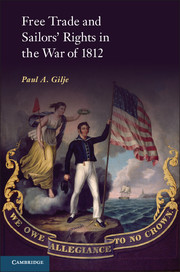4 - Legacy
Published online by Cambridge University Press: 05 March 2013
Summary
In a letter he wrote in 1780, John Adams directly connected free trade to the meaning of the American Revolution. Adams argued that the Americans were not fighting the revolution out of enmity toward the British or anyone else; instead, they were “animated by higher Principles and Better and Stronger Motives than Hatred and Aversion.” Even before he discussed the importance of “the purest principles of Liberty civil and religious,” Adams pointed out that the revolutionaries “universally aspire after a free Trade with all the commercial World, instead of that mean Monopoly, in which they were shackled by great Britain.” Adams believed that “God and Nature intended, that So great a Magazine of Productions the Raw Materials of Manufactures, So great a source of Commerce, and so rich a Nursery of Seamen as America is should be open.”
If Adams identified free trade with the American Revolution, the phrase retained for all Americans in the eighteenth century a certain ambiguity and had multiple meanings. These meanings often shaded into one another and came into clearer focus at one time or another depending upon specific circumstances. The issue of free trade as free markets emerged occasionally in the colonial period, came into sharp relief during the price regulation debates of the Revolutionary War, and developed into an accepted doctrine during the early republic. In his first inaugural, Thomas Jefferson proclaimed faith in the free market at home by declaring that “a wise and frugal Government, which shall restrain men from injuring one another, shall leave them otherwise free to regulate their own pursuits of industry and improvement, and shall not take from the mouth of labor the bread it has earned.” During the colonial period and into the revolutionary crisis, the idea of free trade as a release from mercantile restrictions appeared most prevalent and was reflected in Adams's 1780 letter. But this notion did not disappear after the Revolutionary War. Newspapers published Adams's letter at least twice – in 1789 and 1796 – and Americans seized the opportunity offered by the Anglo-French wars that began in 1793 to challenge colonial mercantile barriers in the West Indies and even put aside racial prejudice to trade with the regime of Toussaint Louverture in St. Domingue in 1799 and 1800. Although the issue of reciprocity was not prevalent before independence, inspired by the ideals of the Enlightenment it became a central tenet of American diplomacy.
- Type
- Chapter
- Information
- Free Trade and Sailors' Rights in the War of 1812 , pp. 65 - 68Publisher: Cambridge University PressPrint publication year: 2013



